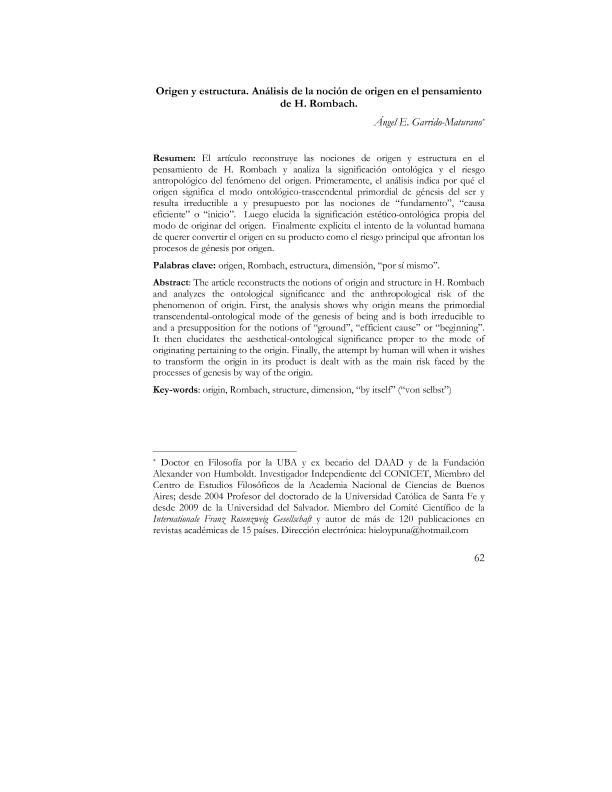Artículo
El artículo reconstruye las nociones de origen y estructura en el pensamiento de H. Rombach y analiza la significación ontológica y el riesgo antropológico del fenómeno del origen. Primeramente, el análisis indica por qué el origen significa el modo ontológico-trascendental primordial de génesis del ser y resulta irreductible a y presupuesto por las nociones de “fundamento”, “causa eficiente” o “inicio”. Luego elucida la significación estético-ontológica propia del modo de originar del origen. Finalmente explicita el intento de la voluntad humana de querer convertir el origen en su producto como el riesgo principal que afrontan los procesos de génesis por origen. The article reconstructs the notions of origin and structure in H. Rombach and analyzes the ontological significance and the anthropological risk of the phenomenon of origin. First, the analysis shows why origin means the primordial transcendental-ontological mode of the genesis of being and is both irreducible to and a presupposition for the notions of “ground”, “efficient cause” or “beginning”. It then elucidates the aesthetical-ontological significance proper to the mode of originating pertaining to the origin. Finally, the attempt by human will when it wishes to transform the origin in its product is dealt with as the main risk faced by the processes of genesis by way of the origin.
Origen y estructura. Análisis de la noción de origen en el pensamiento de H. Rombach
Fecha de publicación:
12/2016
Editorial:
Asociación Revista de Filosofía de Santa Fe
Revista:
Tópicos
ISSN:
1668-723X
Idioma:
Español
Tipo de recurso:
Artículo publicado
Clasificación temática:
Resumen
Palabras clave:
Origen
,
Rombach
,
Estructura
,
"Por Sí Mismo"
,
Dimensión
Archivos asociados
Licencia
Identificadores
Colecciones
Articulos(IIGHI)
Articulos de INST.DE INVEST.GEOHISTORICAS (I)
Articulos de INST.DE INVEST.GEOHISTORICAS (I)
Citación
Garrido Maturano, Ángel Enrique; Origen y estructura. Análisis de la noción de origen en el pensamiento de H. Rombach; Asociación Revista de Filosofía de Santa Fe; Tópicos; 31; 12-2016; 62-84
Compartir




